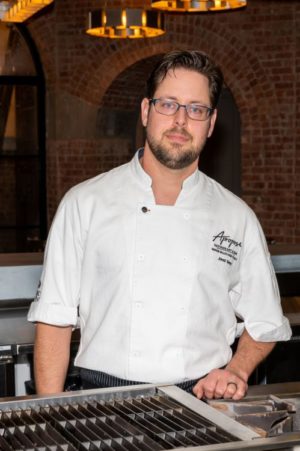
The food industry has been acutely impacted by supply chain disruptions that resulted in dramatic price increases and a scarcity of goods.
Alina Dancho is one food industry professional who has attempted to mitigate the effects of the global supply chain disruption. Dancho runs Alina”™s Cakes & Cookies in Fairfield, a small bakery that serves traditional European baked goods and treats.
“Whatever I order that comes from Germany and Belgium, I ordered two paces ahead, so I”™ve been ahead of the pricing as well because I knew it was coming,” Dancho said, adding that price increases affected flour, sugar, eggs and oil, all seeing an increase of more than 25%.
Other regional businesses have been similarly affected by this supply bottleneck and skyrocketing prices. Executive Chef Jared Secor of Apropos Restaurant & Bar in Peekskill witnessed dramatic increases in certain food items, such as fingerling potatoes, which in one week had gone up 40%.
“It seems that things that weigh a lot, weigh a lot for shipping companies to move and (there is) just more labor involved,” Secor added that heavier items have seen the most intense price hikes, noting that on “a 50-pound bag of potatoes, the price has changed dramatically.”
Even elected officials have been concerned about the impact of supply chain disruptions on their local food industry outlets. Matthew Slater, town supervisor of Yorktown, observed that restaurants in his community are not only purchasing as much as they can, but must also contend with meeting order minimums.
“When they do their weekly inventory, if they”™re not crossing the minimum threshold, they can”™t even order it,” Slater said. “They”™re changing how often they put their orders in (for products), and obviously it impacts their menu and what they”™re able to serve.”

Even nonfood items have become difficult to acquire. Secor recalled, “I could not get parchment paper, just sheet tray liners for the past two months. And I bought one box of it when I had the ability to, and they ended up not even having it so I could buy it again.”
Alina”™s Cakes & Cookies has been more fortunate in this regard, being able to obtain the paper and plastic needed for packaging. However, these items have seen price increases over 60%.
“I pay over $3,000 in paper and plastic a month, which is ridiculous,” Dancho said.
Slater pointed out that supply issues have also caused problems for chain businesses opening up in Yorktown such as Trader Joe”™s and CoCo Farms, which for a long period of time were unable to obtain refrigerators, resulting in delayed openings.
Businesses have responded by staying ahead of prices, ordering well in advance and stockpiling what they can. Dancho made an effort of placing orders from her suppliers ahead of time and feels that, at the moment, her business has enough materials.
“We are a little more fortunate when it comes to being a bake shop, in that you can stockpile ”” not the eggs and the milk and the cream ”” but flour and sugar if I need to, so I”™m good for two months,” Dancho said. “But at the same time, I don”™t have (a lot of) space. I can”™t just fill it all up with flour.”
Secor was familiar with the limits of stockpiling in spaces with limited room to spare. Recalling his past experiences, Secor said, “Coming from New York City, where I”™ve been (in) very small kitchens, a lot of places don”™t have the luxury to stockpile items, they”™re just having to do a constant rotation.” However, since Apropos is located in The Abbey Inn & Spa, the restaurant has “the luxury of having the hotel, which has lots of storage.”
In circumstances where a supplier is unable to provide Secor and his team with certain materials, they have been upfront in telling guests that Apropos.
“You”™ll still have the guest pushing back, saying that the menu selections are limited and things along those lines,” Secor said, but that “people are beginning to understand that items are going to be difficult to find.”
To better combat the price increases in materials, businesses have looked to raising prices on their own products.
“Everyone”™s putting notices up in their restaurants or their pizza places that prices have increased because the supply is demanding it,” Slater said of Yorktown”™s food businesses. “They”™re forced to spend more on their products to make their goods, and that”™s being passed on to the consumers, there”™s no doubt about it.”
Dancho”™s Fairfield business has likewise increased menu prices by 5% to 6%, which she said is necessary for it to stay afloat. Secor has tried keeping prices on Apropos”™ menu the same as much as possible, resulting in some alterations to dishes, such as “taking cheaper cuts of meat, or something that takes more preparation, so putting more labor into cheaper items to increase their value.”
Though Slater noted that “one of the first things people cut out is going out to eat” during economic downturns, Secor and Dancho”™s respective efforts to fight back the effects of the supply chain disruption, along with their positive reception beforehand, has meant that the stream of customers has remained sustainable, if not better.
“The numbers have definitely increased,” Secor said of Apropos”™ customers. “People want to go out and enjoy themselves.”
And with summer approaching, both businesses look forward to more special functions, like weddings, to be held to further increase customer traffic.
“Our neighborhood has been pretty good and they”™ve been helping us, and they”™ve been staying with us all this time, so as long as we can pay the bills, we”™ll be here. We won”™t give up,” Dancho said.




















